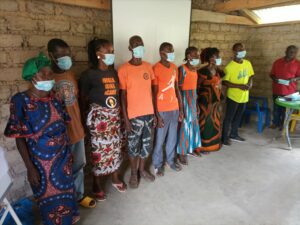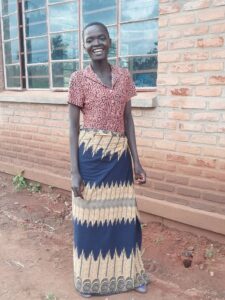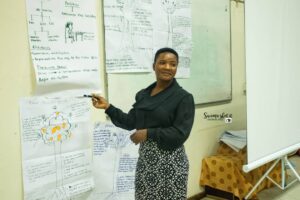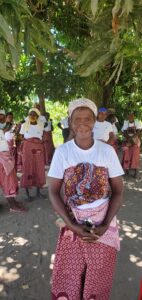In many countries men control who gets to use, own, and make decisions about land.
“We used to stay in a corner, quiet. If someone came to take our land or exploit our forests, we did not have the courage to try to stop them.” These words from a woman in Mecoburi, Mozambique reflect how women across the world often feel powerless to defend their rights to land and natural resources. For rural communities, land means everything, from the ability to produce crops for food and income to leveraging financial assets.
Although women play critical roles in agriculture and food production, they are less likely to access agricultural inputs and other productive resources and have fewer opportunities to engage in commercial agroforestry value chains. Even when laws and policy provide for gender equality, women face many other barriers to secure land rights, including weak implementation, gender norms that prevent women from owning property, unequal inheritance practices, limited knowledge about their land rights, time constraints to participate in land registration and governance activities, and increased vulnerability to gender-based violence.
Empowering women in land and natural resources
Since 2018, the USAID Integrated Land and Resource Governance (ILRG) program has been implementing innovative and ambitious partnerships with communities, governments, traditional leaders, civil society organizations, and the private sector to promote gender equality and women’s economic empowerment by improving land tenure, resource governance, and making agroforestry value chains more inclusive across six countries. The program has impacted the lives of over 143,000 women who have benefited from documented land rights, participation in land and natural resource governance, and access to related benefits such as credit, agricultural extension, and livelihoods opportunities. Across Ghana, India, Liberia, Malawi, Mozambique, and Zambia, USAID supports the adoption of laws and policies that strengthen women’s land rights; ensures women’s participation in systematic land documentation processes; increases women’s participation in value chains; promotes changes in discriminatory gender norms; and minimizes risk of gender-based violence. In each of these countries, women have overcome harmful gender biases, stereotypes, and discrimination and are leading their communities toward more inclusive, environmentally sustainable land and natural resource management that brings economic benefits to all.
Meet the Groundbreakers

Patricia Geh (third from right) with the other elected members of the Zor Yolowee community land development and management committee. As vice-president of the committee, she is leading decision-making on how land and other resources are managed in her community. Photo credit: Green Advocates International.
In Liberia, community land development and management committees are responsible for making decisions about the administration and use of customary land. In five communities surrounding the Blei Community Forest, USAID is raising awareness about customary land tenure rights. The project uses gender-balanced facilitation teams to teach the importance of women’s participation in the committees and provides women with technical knowledge on land governance. In the pilot communities, today women account for 43 percent of committee members, and many have been nominated to serve in leadership positions. Patricia Geh was elected vice-president of the Zor Yolowee Committee in a region with important forest resources, which are managed by the community. Because of this work, she explained, women now understand their rights and are actively participating in meetings, making decisions alongside men and elders. Patricia feels confident that she can help lead the community to use the resources in a sustainable way, saying, “We will ‘use some and keep some,’ so the future generations can enjoy them too.”

Deribe Kanjauke was elected a member of her village’s customary land committee in Malawi and will lead land governance in the community during the systematic land documentation process supported by USAID. Photo credit: Vincent Moses/ILRG.
Similarly, customary land committees are responsible for documenting and administering land in Malawi. Despite laws that ensure women’s representation in the committees, many women have little to no information about their land rights, including their right to run for leadership positions. USAID is working with the Ministry of Lands in Malawi to document customary land in the Traditional Area of Mwansambo in Nkhotakota district and raise awareness about the importance of women’s participation in the documentation process, which aims to benefit at least 10,000 people by 2023. Deribe Kanjauke says that because of USAID’s gender equality efforts in her community, she is eager to actively participate and lead land governance initiatives in her community. Although at first people doubted that women could fulfill this important role, she was determined to overcome this barrier and represent women’s voices. Now elected to her village committee, Deribe said, “I want to see that the land documentation process goes according to the law, the way it is supposed to be. I want to make sure that women are not discriminated against or get their land grabbed and that when parents die, neither boys nor girls lose their land.”

After attending USAID-funded training on women’s leadership and empowerment, Community Liaison Assistant Nancy Mutemba increased her community outreach to increase women’s participation in natural resource management in Zambia. Photo: Muswema Chanda.
In Zambia, USAID is working with 16 governmental and non-governmental organizations to increase awareness about women’s role in the sustainable and transparent management of natural resources that are critical to the livelihoods of rural communities. Nancy Mutemba, 26, works as a Community Liaison Assistant with USAID partner Frankfurt Zoological Society. She received USAID-funded training on women’s leadership and empowerment in natural resource governance, and explained that the training opened her eyes about her own abilities and the prevalence of deep-rooted gender norms that prevent most women in her community from controlling critical resources. “I understood that poverty was so real because our important resources and sources of income were being mismanaged and women had no say nor benefit. I decided to start including messages on women’s participation in decision-making at household and community levels during my community facilitation work.” Working with community facilitators like Nancy, USAID has helped increase women’s participation in wildlife law enforcement and in community governance. In Mukungule Chiefdom, where Nancy works, women’s representation in community resource boards increased from 25 percent in 2016 to 62 percent in 2020.

Sujata Pramanick is a smallholder farmer and community agronomist in West Bengal, India, where she is leading other women and farming families in the PepsiCo potato supply chain to adopt sustainable farming practices that increase their productivity while conserving soil health and reducing greenhouse gas emissions. Photo credit: Subarna Maitra/ILRG
Secure land tenure is pivotal for rural women’s economic empowerment, leading to greater influence in household decision-making and the ability to enter and benefit from commercial value chains. In India, USAID is partnering with PepsiCo to increase women’s participation in PepsiCo’s supply chains. Since 2019, over 1,000 women have benefitted from training to learn the technical skills needed to enter the PepsiCo potato supply chain. In addition, these women farmers are guiding their farming families and communities to adopt sustainable farming practices that both increase productivity and meet climate change mitigation and adaptation goals. Sujata Pramanick is a 34-year-old potato farmer and women’s group leader from Barasat in West Bengal. Although she manages all activities on the family’s small farm that supplies potatoes to PepsiCo, only her husband’s name is listed on their land title and therefore his is the only name included on PepsiCo’s suppliers’ list. Over the past two years, however, Sujata attended several trainings on women’s empowerment and agricultural practices and was selected as a part-time Community Agronomist, responsible for disseminating information and supporting other farmers in her village. Receiving targeted technical knowledge for the first time enabled her to increase production on her family farm and encourage others to wear protective equipment and manage waste responsibly, so farmers and the environment are healthier. She feels valued not only in the community, but also in her household: she now actively participates in decision-making about household investments and expenditures, and this year Sujata’s husband asked PepsiCo to list her name as the PepsiCo supplier.

Odete Pereira with the women from the producers’ club she leads in Zambezia, Mozambique. With USAID support, over 1,300 smallholder farmers received long term use rights of land belonging to Grupo Madal and are now able to produce crops for subsistence and for sale to Madal and other companies. Photo credit: Thais Bessa/ILRG.
USAID is working with private sector partner Grupo Madal in Mozambique to solve potential land conflicts with communities in ways that benefit both smallholder farmers and the company. Due to scarce arable land and a growing population, farmers have encroached upon Madal’s lands for subsistence farming, creating conflict not only with Madal, but between farming families. Rather than evicting them, Madal worked with USAID to create a program that allows 1,300 farmers – 85 percent of whom are women – to secure long term use rights to the land. With these rights, the farmers can grow crops to feed their families and for profit in partnership with Madal. Odete Pereira, a 54-year-old mother of six, is one of the farmers working with Madal under this new program. She was recently elected president of her local producers’ club, a group of 20 women who work together to organize their production and engagement with the company and other potential buyers. The delimitation of land for smallholders under the USAID-Madal partnership decreased conflict between communities and the company and within communities. Farmers feel safer and more confident to use the land and engage in commercial value chains that can significantly improve their income-earning potential. USAID also supported trainings for the newly formed producers’ clubs, including a 12-week women’s empowerment and leadership training. Odete said the trainings changed how women see themselves and taught them to understand and recognize gender norms within their households. “I never knew women were allowed to participate in decisions with men. I saw a difference in my relationship with my husband. He realized I deserve respect. He used to go out and leave me with all the housework. Now he is back home when I need to attend training or meetings. Before, if we earned 100 meticais [USD 1.50] he said it was all his, even though I was the one who worked the land. Now we plan things together, and we know we need to save 20 meticais to make repairs in our house and spend 80 to buy food and school uniforms for the children,” she said.
Women like Patricia, Delibe, Nancy, Sujata, and Odete are paving the way toward equal land and natural resource rights, leading to social, economic, and environmental benefits for their families, communities, and other stakeholders. With greater participation by women in land and natural resource governance, women and their families are able to access a wider variety of income opportunities and overcome traditional barriers that prevent women from having equal rights to land. In addition, expanding leadership opportunities for women in land and natural resource governance gives women greater recognition and stature in their households and communities, which can lead to more responsible and equitable household expenditures, greater food security, more sustainable management of natural resources, and increased adoption of farming practices that mitigate climate change risks.
USAID is working to build the capacity of women leaders in developing countries by strengthening women’s land and resource rights, helping women run for elected bodies, and training them to meaningfully contribute to community governance. Increasing rural women’s access to land and natural resources is a core element in advancing gender equality, as land is the main asset of the rural poor. This International Women’s Day, USAID invites other organizations working towards gender equality to join them in advocating for women’s land and resource rights in developing countries, to help equip and empower the women leaders in other communities to be agents of change.

